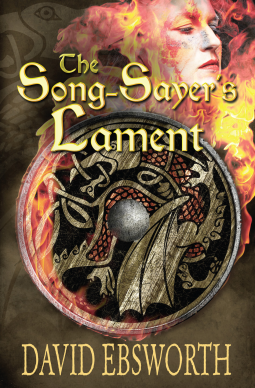
The Song-Sayer's Lament
A Novel of Sixth-Century Britain
by David Ebsworth
This title was previously available on NetGalley and is now archived.
Send NetGalley books directly to your Kindle or Kindle app
1
To read on a Kindle or Kindle app, please add kindle@netgalley.com as an approved email address to receive files in your Amazon account. Click here for step-by-step instructions.
2
Also find your Kindle email address within your Amazon account, and enter it here.
Pub Date 17 May 2016 | Archive Date 18 Jun 2016
Description
In the lands once named Britannia by the Roman Empire and its vanished Legions, the song-sayers still weave their words into the lore by which everyday life is ordered, into the myths and sagas of hero-tales, and into the very fates that will determine whether the years ahead shall be bathed in shining light or plunged into a terrible darkness.
In his fifth novel, David Ebsworth brings to life the stories of young warlord Ambros Skyhound, and the blind song-sayer, Morgose, told through the words of teacher and mentor Meridden of Sea Fort.
Advance Praise
"David Ebsworth takes you into the sixth century with flawless ease." - Helen Hollick, author of The Pendragon's Banner trilogy
"A detailed re-imagining of post-Roman Britain in a tale of warlord rivalry, betrayal, plague, heartbreak and famine." - Alison Morton, author of the acclaimed Roma Nova series
"David Ebsworth has woven a rich, glorious, intricate tapestry of the time we know of as the Dark Ages. With echoes of Rosemary Sutcliff's magnificent Sword at Sunset and Mary Stewart's Crystal Cave series, this is at once a fast, fierce tale of the old gods versus the new, of old politics and honour replaced by venal expediency - and of humanity in the face of implacable disease as the first great plague swept through. It's steeped in authenticity and heart. I loved it!" - Manda Scott, author of the bestselling Boudica series and Into the Fire
Available Editions
| EDITION | Paperback |
| ISBN | 9781781325117 |
| PRICE | £10.99 (GBP) |
Links
Featured Reviews
 Lindsey R, Reviewer
Lindsey R, Reviewer
I’m not sure what I was expected from The Song-Sayer’s Lament. I think the hints of the Arthurian legend misled me because I was expecting it to link up with the story that I know.
It took me a while to get into it. The descriptions are long, and both people and places are given many different names – the majority used every time they are mentioned. It left my head reeling a little as to which were locations and which were people! This distanced me from the opening of the novel; my focus was on keeping track of what was going on, not the plot and the characters.
The plot follows Merriden, a renowned Mentor tasked with passing on his wisdom to a young Ambros Skyhound. Merriden, for the most part, is a likeable character: you sense his desire to protect, preserve and pass on knowledge, but also that he is prepared to fight and, if necessary, die for Ambros.
Merriden appears to have conflicting loyalties. His desire for Ambros’ treacherous wife not only causes trouble, but haunts him for the rest of the novel. The reader knows he loves Ambros like a son; it weakened his character to have his loyalty tested in such a way because of a woman who scorns him.
I really liked Ambros at the beginning. He is determined to unite the lands and protect his people (the Arthurian link). His budding relationship with Morgose is realistic and actually quite sweet – it works compared to Merriden’s desires.
But Ambros uses and deceives Merriden too many times for him to remain a likeable character. If Ambros was the narrator, these events would show a good leader. But the reader is linked with Merriden and feels his betrayal rather than Ambros’ reasoning. I couldn’t connect with his character by the end, although could still empathise with his plight.
Once you get used to the style of writing, the plot is straightforward – as long as you can keep track of who is a suspected traitor, who is a new ally and who is the foe. They switch places a lot!
There are a lot of fights and battles throughout this book. But Ebsworth does something I’ve never seen before: he glosses over them.
It works!
Merriden’s narration reveals how everything is a haze once a battle starts, so Ebsworth doesn’t take pages to recount the different tactics to hold against the enemy. He simply states that they held. Personally, I felt it kept the narration not only focused, but realistic, and stopped it turning into a long-winded novel.
There was too much religion for me. The book would have benefited from more character development compared to religious discussions. Morgose is supposed to be both a Christ-Bride and a Song-Sayer, but I never quite understood the power of the Song-Sayer’s and why they were revered, therefore her character’s importance was undermined for me.
An enjoyable book as long as you pay attention!



